Represents a JSON value. More...
#include "json.h"
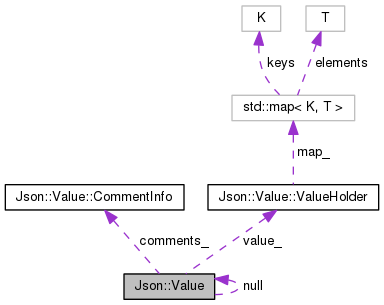
Classes | |
| struct | CommentInfo |
| class | CZString |
| union | ValueHolder |
Public Types | |
| typedef std::vector< std::string > | Members |
| typedef ValueIterator | iterator |
| typedef ValueConstIterator | const_iterator |
| typedef Json::UInt | UInt |
| typedef Json::Int | Int |
| typedef Json::UInt64 | UInt64 |
| typedef Json::Int64 | Int64 |
| typedef Json::LargestInt | LargestInt |
| typedef Json::LargestUInt | LargestUInt |
| typedef Json::ArrayIndex | ArrayIndex |
| typedef std::map< CZString, Value > | ObjectValues |
Public Member Functions | |
| Value (ValueType type=nullValue) | |
| Create a default Value of the given type. More... | |
| Value (Int value) | |
| Value (UInt value) | |
| Value (Int64 value) | |
| Value (UInt64 value) | |
| Value (double value) | |
| Value (const char *value) | |
| Value (const char *beginValue, const char *endValue) | |
| Value (const StaticString &value) | |
| Constructs a value from a static string. More... | |
| Value (const std::string &value) | |
| Value (bool value) | |
| Value (const Value &other) | |
| ~Value () | |
| Value & | operator= (Value other) |
| void | swap (Value &other) |
| Swap values. More... | |
| ValueType | type () const |
| bool | operator< (const Value &other) const |
| bool | operator<= (const Value &other) const |
| bool | operator>= (const Value &other) const |
| bool | operator> (const Value &other) const |
| bool | operator== (const Value &other) const |
| bool | operator!= (const Value &other) const |
| int | compare (const Value &other) const |
| const char * | asCString () const |
| std::string | asString () const |
| Int | asInt () const |
| UInt | asUInt () const |
| Int64 | asInt64 () const |
| UInt64 | asUInt64 () const |
| LargestInt | asLargestInt () const |
| LargestUInt | asLargestUInt () const |
| float | asFloat () const |
| double | asDouble () const |
| bool | asBool () const |
| bool | isNull () const |
| bool | isBool () const |
| bool | isInt () const |
| bool | isInt64 () const |
| bool | isUInt () const |
| bool | isUInt64 () const |
| bool | isIntegral () const |
| bool | isDouble () const |
| bool | isNumeric () const |
| bool | isString () const |
| bool | isArray () const |
| bool | isObject () const |
| bool | isConvertibleTo (ValueType other) const |
| ArrayIndex | size () const |
| Number of values in array or object. More... | |
| bool | empty () const |
| Return true if empty array, empty object, or null; otherwise, false. More... | |
| bool | operator! () const |
| Return isNull() More... | |
| void | clear () |
| Remove all object members and array elements. More... | |
| void | resize (ArrayIndex size) |
| Resize the array to size elements. More... | |
| Value & | operator[] (ArrayIndex index) |
| Access an array element (zero based index ). More... | |
| Value & | operator[] (int index) |
| Access an array element (zero based index ). More... | |
| const Value & | operator[] (ArrayIndex index) const |
| Access an array element (zero based index ) (You may need to say 'value[0u]' to get your compiler to distinguish this from the operator[] which takes a string.) More... | |
| const Value & | operator[] (int index) const |
| Access an array element (zero based index ) (You may need to say 'value[0u]' to get your compiler to distinguish this from the operator[] which takes a string.) More... | |
| Value | get (ArrayIndex index, const Value &defaultValue) const |
| If the array contains at least index+1 elements, returns the element value, otherwise returns defaultValue. More... | |
| bool | isValidIndex (ArrayIndex index) const |
| Return true if index < size(). More... | |
| Value & | append (const Value &value) |
| Append value to array at the end. More... | |
| Value & | operator[] (const char *key) |
| Access an object value by name, create a null member if it does not exist. More... | |
| const Value & | operator[] (const char *key) const |
| Access an object value by name, returns null if there is no member with that name. More... | |
| Value & | operator[] (const std::string &key) |
| Access an object value by name, create a null member if it does not exist. More... | |
| const Value & | operator[] (const std::string &key) const |
| Access an object value by name, returns null if there is no member with that name. More... | |
| Value & | operator[] (const StaticString &key) |
| Access an object value by name, create a null member if it does not exist. More... | |
| Value | get (const char *key, const Value &defaultValue) const |
| Return the member named key if it exist, defaultValue otherwise. More... | |
| Value | get (const std::string &key, const Value &defaultValue) const |
| Return the member named key if it exist, defaultValue otherwise. More... | |
| Value | removeMember (const char *key) |
| Remove and return the named member. More... | |
| Value | removeMember (const std::string &key) |
| Same as removeMember(const char*) More... | |
| bool | isMember (const char *key) const |
| Return true if the object has a member named key. More... | |
| bool | isMember (const std::string &key) const |
| Return true if the object has a member named key. More... | |
| Members | getMemberNames () const |
| Return a list of the member names. More... | |
| void | setComment (const char *comment, CommentPlacement placement) |
| Comments must be //... or /* ... */. More... | |
| void | setComment (const std::string &comment, CommentPlacement placement) |
| Comments must be //... or /* ... */. More... | |
| bool | hasComment (CommentPlacement placement) const |
| std::string | getComment (CommentPlacement placement) const |
| Include delimiters and embedded newlines. More... | |
| std::string | toStyledString () const |
| const_iterator | begin () const |
| const_iterator | end () const |
| iterator | begin () |
| iterator | end () |
| void | setOffsetStart (size_t start) |
| void | setOffsetLimit (size_t limit) |
| size_t | getOffsetStart () const |
| size_t | getOffsetLimit () const |
Static Public Attributes | |
| static const Value & | null = reinterpret_cast<const Value&>(kNullRef) |
| static const LargestInt | minLargestInt = LargestInt(~(LargestUInt(-1) / 2)) |
| Minimum signed integer value that can be stored in a Json::Value. More... | |
| static const LargestInt | maxLargestInt = LargestInt(LargestUInt(-1) / 2) |
| Maximum signed integer value that can be stored in a Json::Value. More... | |
| static const LargestUInt | maxLargestUInt = LargestUInt(-1) |
| Maximum unsigned integer value that can be stored in a Json::Value. More... | |
| static const Int | minInt = Int(~(UInt(-1) / 2)) |
| Minimum signed int value that can be stored in a Json::Value. More... | |
| static const Int | maxInt = Int(UInt(-1) / 2) |
| Maximum signed int value that can be stored in a Json::Value. More... | |
| static const UInt | maxUInt = UInt(-1) |
| Maximum unsigned int value that can be stored in a Json::Value. More... | |
| static const Int64 | minInt64 = Int64(~(UInt64(-1) / 2)) |
| Minimum signed 64 bits int value that can be stored in a Json::Value. More... | |
| static const Int64 | maxInt64 = Int64(UInt64(-1) / 2) |
| Maximum signed 64 bits int value that can be stored in a Json::Value. More... | |
| static const UInt64 | maxUInt64 = UInt64(-1) |
| Maximum unsigned 64 bits int value that can be stored in a Json::Value. More... | |
Private Member Functions | |
| void | initBasic (ValueType type, bool allocated=false) |
| Value & | resolveReference (const char *key, bool isStatic) |
Private Attributes | |
| union Json::Value::ValueHolder | value_ |
| ValueType | type_: 8 |
| int | allocated_: 1 |
| CommentInfo * | comments_ |
| size_t | start_ |
| size_t | limit_ |
Friends | |
| class | ValueIteratorBase |
Represents a JSON value.
This class is a discriminated union wrapper that can represents a:
The type of the held value is represented by a ValueType and can be obtained using type().
values of an objectValue or arrayValue can be accessed using operator[]() methods. Non const methods will automatically create the a nullValue element if it does not exist. The sequence of an arrayValue will be automatically resize and initialized with nullValue. resize() can be used to enlarge or truncate an arrayValue.
The get() methods can be used to obtanis default value in the case the required element does not exist.
It is possible to iterate over the list of a objectValue values using the getMemberNames() method.
| typedef Json::Int Json::Value::Int |
| typedef Json::Int64 Json::Value::Int64 |
| typedef ValueIterator Json::Value::iterator |
| typedef std::vector<std::string> Json::Value::Members |
| typedef std::map<CZString, Value> Json::Value::ObjectValues |
| typedef Json::UInt Json::Value::UInt |
| typedef Json::UInt64 Json::Value::UInt64 |
Create a default Value of the given type.
This is a very useful constructor. To create an empty array, pass arrayValue. To create an empty object, pass objectValue. Another Value can then be set to this one by assignment. This is useful since clear() and resize() will not alter types.
Examples:
Default constructor initialization must be equivalent to: memset( this, 0, sizeof(Value) ) This optimization is used in ValueInternalMap fast allocator.


| Json::Value::Value | ( | Int | value | ) |

| Json::Value::Value | ( | UInt | value | ) |

| Json::Value::Value | ( | Int64 | value | ) |

| Json::Value::Value | ( | UInt64 | value | ) |

| Json::Value::Value | ( | double | value | ) |

| Json::Value::Value | ( | const char * | value | ) |

| Json::Value::Value | ( | const char * | beginValue, |
| const char * | endValue | ||
| ) |

| Json::Value::Value | ( | const StaticString & | value | ) |
Constructs a value from a static string.
Like other value string constructor but do not duplicate the string for internal storage. The given string must remain alive after the call to this constructor. Example of usage:

| Json::Value::Value | ( | const std::string & | value | ) |

| Json::Value::Value | ( | bool | value | ) |

| Json::Value::Value | ( | const Value & | other | ) |

| Json::Value::~Value | ( | ) |

Append value to array at the end.
Equivalent to jsonvalue[jsonvalue.size()] = value;

| bool Json::Value::asBool | ( | ) | const |

| const char * Json::Value::asCString | ( | ) | const |

| double Json::Value::asDouble | ( | ) | const |
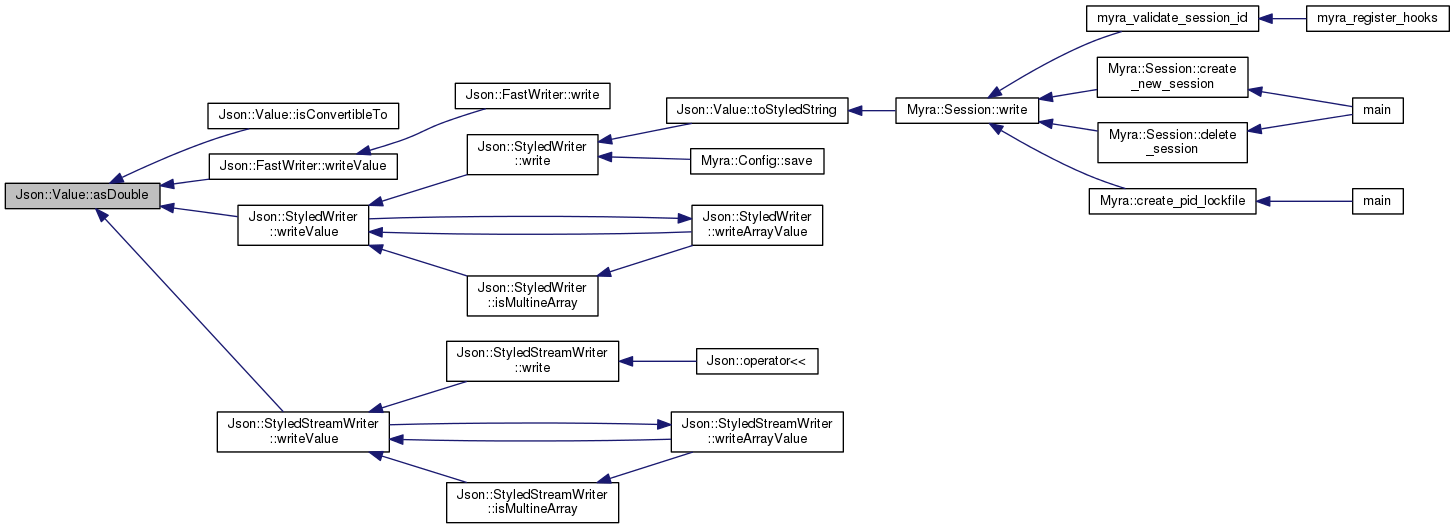
| float Json::Value::asFloat | ( | ) | const |
| Value::Int Json::Value::asInt | ( | ) | const |


| Value::Int64 Json::Value::asInt64 | ( | ) | const |


| LargestInt Json::Value::asLargestInt | ( | ) | const |

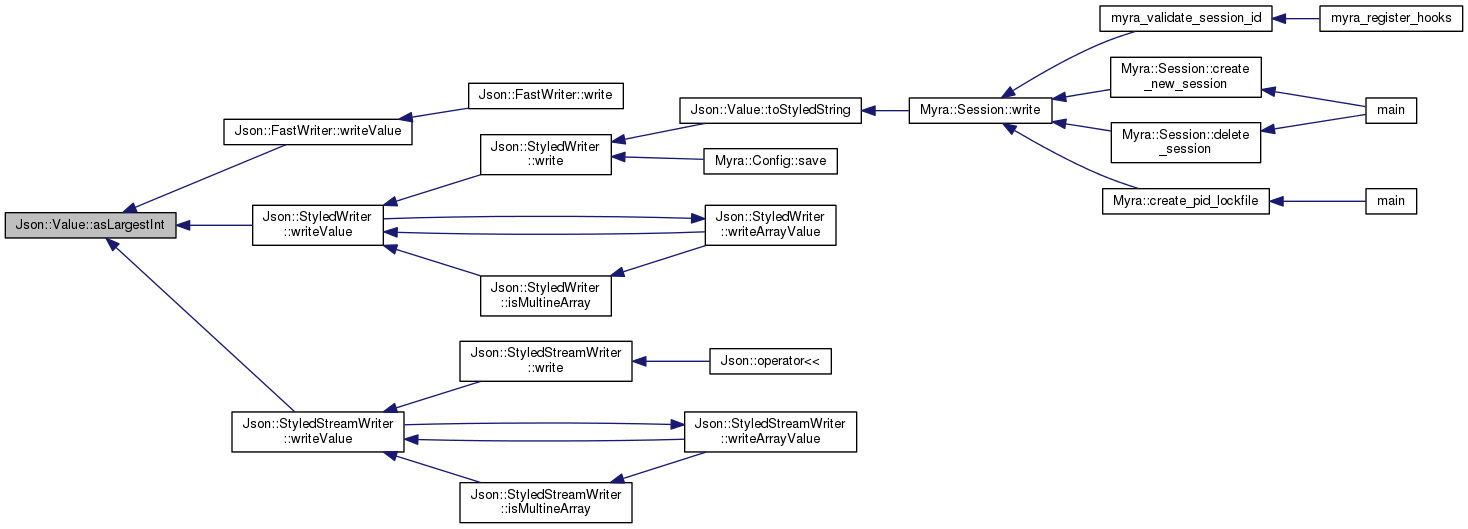
| LargestUInt Json::Value::asLargestUInt | ( | ) | const |

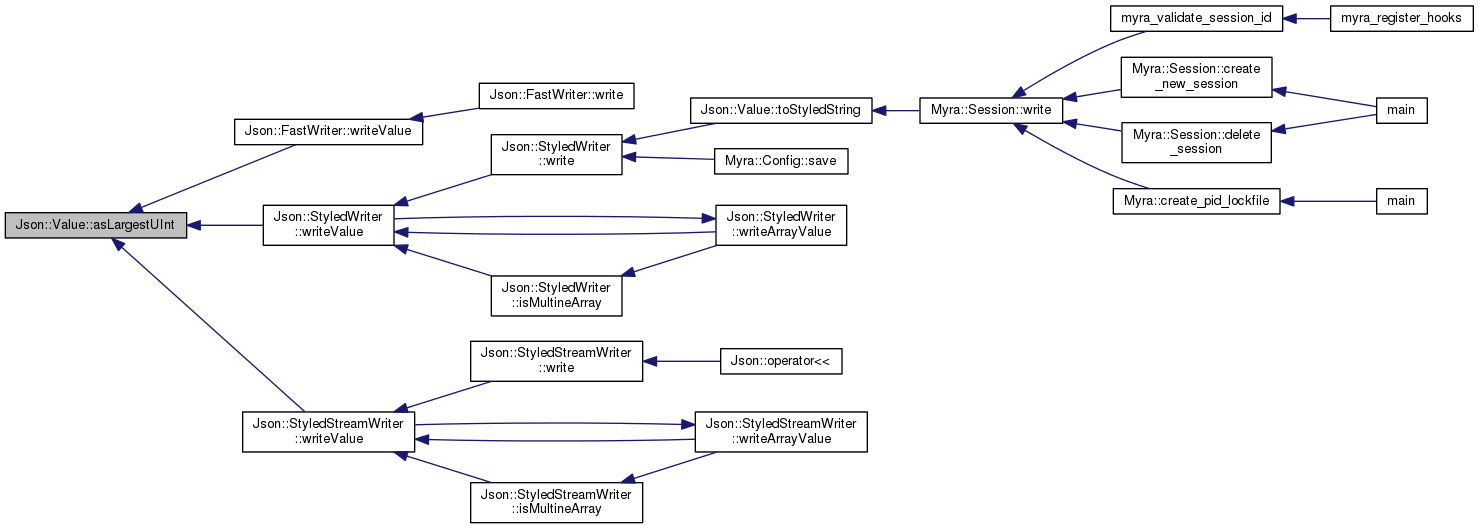
| std::string Json::Value::asString | ( | ) | const |


| Value::UInt Json::Value::asUInt | ( | ) | const |


| Value::UInt64 Json::Value::asUInt64 | ( | ) | const |


| Value::const_iterator Json::Value::begin | ( | ) | const |
| Value::iterator Json::Value::begin | ( | ) |
| void Json::Value::clear | ( | ) |
| int Json::Value::compare | ( | const Value & | other | ) | const |
| bool Json::Value::empty | ( | ) | const |
Return true if empty array, empty object, or null; otherwise, false.
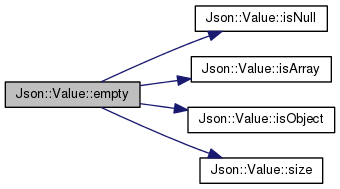
| Value::const_iterator Json::Value::end | ( | ) | const |
| Value::iterator Json::Value::end | ( | ) |
| Value Json::Value::get | ( | ArrayIndex | index, |
| const Value & | defaultValue | ||
| ) | const |
If the array contains at least index+1 elements, returns the element value, otherwise returns defaultValue.
Return the member named key if it exist, defaultValue otherwise.
Return the member named key if it exist, defaultValue otherwise.
| std::string Json::Value::getComment | ( | CommentPlacement | placement | ) | const |
Include delimiters and embedded newlines.

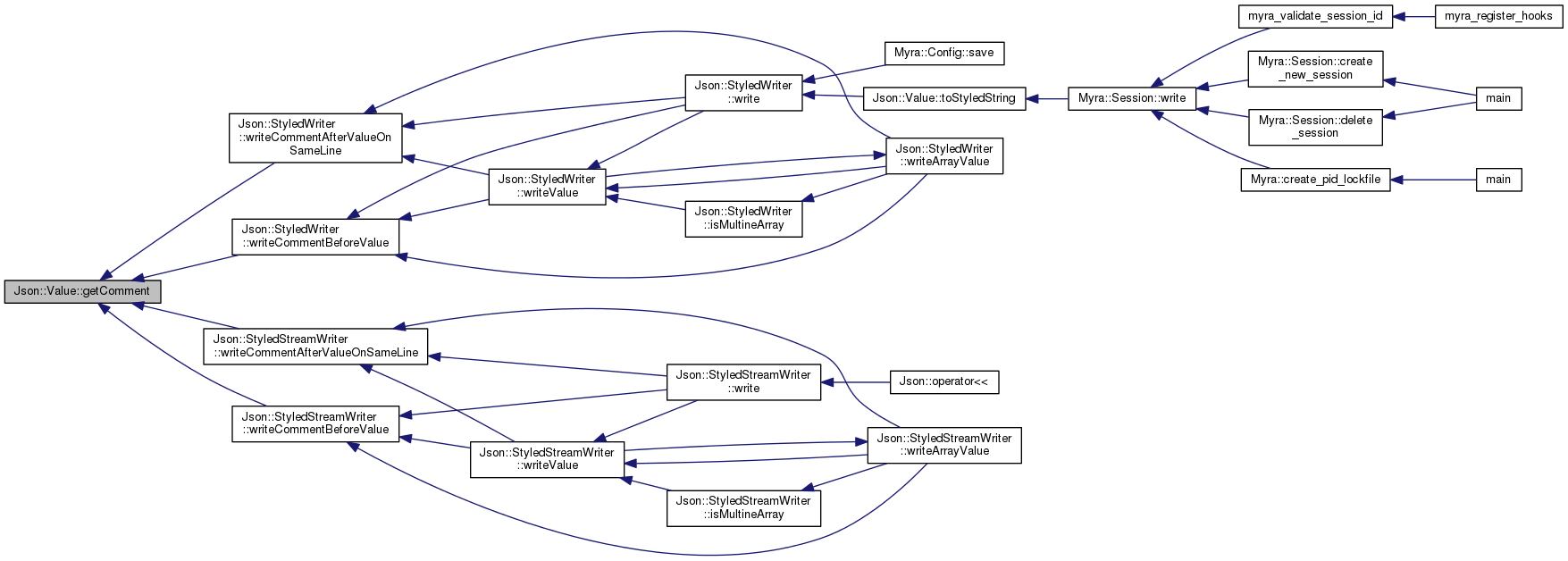
| Value::Members Json::Value::getMemberNames | ( | ) | const |
| size_t Json::Value::getOffsetLimit | ( | ) | const |

| size_t Json::Value::getOffsetStart | ( | ) | const |

| bool Json::Value::hasComment | ( | CommentPlacement | placement | ) | const |

|
private |


| bool Json::Value::isArray | ( | ) | const |

| bool Json::Value::isBool | ( | ) | const |
| bool Json::Value::isConvertibleTo | ( | ValueType | other | ) | const |

| bool Json::Value::isDouble | ( | ) | const |


| bool Json::Value::isInt | ( | ) | const |


| bool Json::Value::isInt64 | ( | ) | const |


| bool Json::Value::isIntegral | ( | ) | const |


| bool Json::Value::isMember | ( | const char * | key | ) | const |
Return true if the object has a member named key.

| bool Json::Value::isMember | ( | const std::string & | key | ) | const |
Return true if the object has a member named key.

| bool Json::Value::isNull | ( | ) | const |

| bool Json::Value::isNumeric | ( | ) | const |


| bool Json::Value::isObject | ( | ) | const |

| bool Json::Value::isString | ( | ) | const |
| bool Json::Value::isUInt | ( | ) | const |


| bool Json::Value::isUInt64 | ( | ) | const |


| bool Json::Value::isValidIndex | ( | ArrayIndex | index | ) | const |
Return true if index < size().


| bool Json::Value::operator! | ( | ) | const |
| bool Json::Value::operator!= | ( | const Value & | other | ) | const |
| bool Json::Value::operator< | ( | const Value & | other | ) | const |
| bool Json::Value::operator<= | ( | const Value & | other | ) | const |
| bool Json::Value::operator== | ( | const Value & | other | ) | const |
| bool Json::Value::operator> | ( | const Value & | other | ) | const |
| bool Json::Value::operator>= | ( | const Value & | other | ) | const |
| Value & Json::Value::operator[] | ( | ArrayIndex | index | ) |
Access an array element (zero based index ).
If the array contains less than index element, then null value are inserted in the array so that its size is index+1. (You may need to say 'value[0u]' to get your compiler to distinguish this from the operator[] which takes a string.)

| Value & Json::Value::operator[] | ( | int | index | ) |
Access an array element (zero based index ).
If the array contains less than index element, then null value are inserted in the array so that its size is index+1. (You may need to say 'value[0u]' to get your compiler to distinguish this from the operator[] which takes a string.)
| const Value & Json::Value::operator[] | ( | ArrayIndex | index | ) | const |
Access an array element (zero based index ) (You may need to say 'value[0u]' to get your compiler to distinguish this from the operator[] which takes a string.)
| const Value & Json::Value::operator[] | ( | int | index | ) | const |
Access an array element (zero based index ) (You may need to say 'value[0u]' to get your compiler to distinguish this from the operator[] which takes a string.)
| Value & Json::Value::operator[] | ( | const char * | key | ) |
Access an object value by name, create a null member if it does not exist.

| const Value & Json::Value::operator[] | ( | const char * | key | ) | const |
Access an object value by name, returns null if there is no member with that name.
| Value & Json::Value::operator[] | ( | const std::string & | key | ) |
Access an object value by name, create a null member if it does not exist.
| const Value & Json::Value::operator[] | ( | const std::string & | key | ) | const |
Access an object value by name, returns null if there is no member with that name.
| Value & Json::Value::operator[] | ( | const StaticString & | key | ) |
Access an object value by name, create a null member if it does not exist.
If the object as no entry for that name, then the member name used to store the new entry is not duplicated. Example of use:

| Value Json::Value::removeMember | ( | const char * | key | ) |
| Value Json::Value::removeMember | ( | const std::string & | key | ) |
| void Json::Value::resize | ( | ArrayIndex | size | ) |
|
private |


| void Json::Value::setComment | ( | const char * | comment, |
| CommentPlacement | placement | ||
| ) |
Comments must be //... or /* ... */.


| void Json::Value::setComment | ( | const std::string & | comment, |
| CommentPlacement | placement | ||
| ) |
Comments must be //... or /* ... */.

| void Json::Value::setOffsetLimit | ( | size_t | limit | ) |

| void Json::Value::setOffsetStart | ( | size_t | start | ) |

| ArrayIndex Json::Value::size | ( | ) | const |
Number of values in array or object.

| void Json::Value::swap | ( | Value & | other | ) |
Swap values.

| std::string Json::Value::toStyledString | ( | ) | const |


| ValueType Json::Value::type | ( | ) | const |

|
friend |
|
private |
|
private |
|
private |
Maximum signed int value that can be stored in a Json::Value.
Maximum signed 64 bits int value that can be stored in a Json::Value.
|
static |
Maximum signed integer value that can be stored in a Json::Value.
|
static |
Maximum unsigned integer value that can be stored in a Json::Value.
Maximum unsigned int value that can be stored in a Json::Value.
Maximum unsigned 64 bits int value that can be stored in a Json::Value.
Minimum signed int value that can be stored in a Json::Value.
Minimum signed 64 bits int value that can be stored in a Json::Value.
|
static |
Minimum signed integer value that can be stored in a Json::Value.
|
private |
|
private |
|
private |